- Home
- George Eliot
Romola Page 7
Romola Read online
Page 7
CHAPTER SIX.
DAWNING HOPES.
When Maso opened the door again, and ushered in the two visitors, Nello,first making a deep reverence to Romola, gently pushed Tito before him,and advanced with him towards her father.
"Messer Bardo," he said, in a more measured and respectful tone than wasusual with him, "I have the honour of presenting to you the Greekscholar, who has been eager to have speech of you, not less from thereport I have made to him of your learning and your pricelesscollections, than because of the furtherance your patronage may give himunder the transient need to which he has been reduced by shipwreck. Hisname is Tito Melema, at your service."
Romola's astonishment could hardly have been greater if the stranger hadworn a panther-skin and carried a thyrsus; for the cunning barber hadsaid nothing of the Greek's age or appearance; and among her father'sscholarly visitors, she had hardly ever seen any but middle-aged orgrey-headed men. There was only one masculine face, at once youthfuland beautiful, the image of which remained deeply impressed on her mind:it was that of her brother, who long years ago had taken her on hisknee, kissed her, and never come back again: a fair face, with sunnyhair, like her own. But the habitual attitude of her mind towardsstrangers--a proud self-dependence and determination to ask for nothingeven by a smile--confirmed in her by her father's complaints against theworld's injustice, was like a snowy embankment hemming in the rush ofadmiring surprise. Tito's bright face showed its rich-tinted beautywithout any rivalry of colour above his black _sajo_ or tunic reachingto the knees. It seemed like a wreath of spring, dropped suddenly inRomola's young but wintry life, which had inherited nothing butmemories--memories of a dead mother, of a lost brother, of a blindfather's happier time--memories of far-off light, love, and beauty, thatlay embedded in dark mines of books, and could hardly give out theirbrightness again until they were kindled for her by the torch of someknown joy. Nevertheless, she returned Tito's bow, made to her onentering, with the same pale proud face as ever; but, as he approached,the snow melted, and when he ventured to look towards her again, whileNello was speaking, a pink flush overspread her face, to vanish againalmost immediately, as if her imperious will had recalled it. Tito'sglance, on the contrary, had that gentle, beseeching admiration in itwhich is the most propitiating of appeals to a proud, shy woman, and isperhaps the only atonement a man can make for being too handsome. Thefinished fascination of his air came chiefly from the absence of demandand assumption. It was that of a fleet, soft-coated, dark-eyed animalthat delights you by not bounding away in indifference from you, andunexpectedly pillows its chin on your palm, and looks up at you desiringto be stroked--as if it loved you.
"Messere, I give you welcome," said Bardo, with some condescension;"misfortune wedded to learning, and especially to Greek learning, is aletter of credit that should win the ear of every instructed Florentine;for, as you are doubtless aware, since the period when your countryman,Manuelo Crisolora, diffused the light of his teaching in the chiefcities of Italy, now nearly a century ago, no man is held worthy of thename of scholar who has acquired merely the transplanted and derivativeliterature of the Latins; rather, such inert students are stigmatised as_opici_ or barbarians according to the phrase of the Romans themselves,who frankly replenished their urns at the fountain-head. I am, as youperceive, and as Nello has doubtless forewarned you, totally blind: acalamity to which we Florentines are held especially liable, whetherowing to the cold winds which rush upon us in spring from the passes ofthe Apennines, or to that sudden transition from the cool gloom of ourhouses to the dazzling brightness of our summer sun, by which the_lippi_ are said to have been made so numerous among the ancient Romans;or, in fine, to some occult cause which eludes our superficial surmises.But I pray you be seated: Nello, my friend, be seated."
Bardo paused until his fine ear had assured him that the visitors wereseating themselves, and that Romola was taking her usual chair at hisright-hand. Then he said--
"From what part of Greece do you come, Messere? I had thought that yourunhappy country had been almost exhausted of those sons who couldcherish in their minds any image of her original glory, though indeedthe barbarous Sultans have of late shown themselves not indisposed toengraft on their wild stock the precious vine which their own fiercebands have hewn down and trampled under foot. From what part of Greecedo you come?"
"I sailed last from Nauplia," said Tito; "but I have resided both atConstantinople and Thessalonica, and have travelled in various partslittle visited by Western Christians since the triumph of the Turkisharms. I should tell you, however, Messere, that I was not born inGreece, but at Bari. I spent the first sixteen years of my life inSouthern Italy and Sicily."
While Tito was speaking, some emotion passed, like a breath on thewaters, across Bardo's delicate features; he leaned forward, put out hisright-hand towards Romola, and turned his head as if about to speak toher; but then, correcting himself, turned away again, and said, in asubdued voice--
"Excuse me; is it not true--you are young?"
"I am three-and-twenty," said Tito.
"Ah," said Bardo, still in a tone of subdued excitement, "and you had,doubtless, a father who cared for your early instruction--who, perhaps,was himself a scholar?"
There was a slight pause before Tito's answer came to the ear of Bardo;but for Romola and Nello it began with a slight shock that seemed topass through him, and cause a momentary quivering of the lip; doubtlessat the revival of a supremely painful remembrance.
"Yes," he replied, "at least a father by adoption. He was a Neapolitan,and of accomplished scholarship, both Latin and Greek. But," addedTito, after another slight pause, "he is lost to me--was lost on avoyage he too rashly undertook to Delos."
Bardo sank backward again, too delicate to ask another question thatmight probe a sorrow which he divined to be recent. Romola, who knewwell what were the fibres that Tito's voice had stirred in her father,felt that this new acquaintance had with wonderful suddenness got withinthe barrier that lay between them and the alien world. Nello, thinkingthat the evident check given to the conversation offered a gracefulopportunity for relieving himself from silence, said--
"In truth, it is as clear as Venetian glass that this fine young man hashad the best training; for the two Cennini have set him to work at theirGreek sheets already, and it seems to me they are not men to begincutting before they have felt the edge of their tools; they tested himwell beforehand, we may be sure, and if there are two things not to behidden--love and a cough--I say there is a third, and that is ignorance,when once a man is obliged to do something besides wagging his head.The _tonsor inequalis_ is inevitably betrayed when he takes the shearsin his hand; is it not true, Messer Bardo? I speak after the fashion ofa barber, but, as Luigi Pulci says--
"`Perdonimi s'io fallo: chi m'ascolta Intenda il mio volgar col suo latino.'"
"Nay, my good Nello," said Bardo, with an air of friendly severity, "youare not altogether illiterate, and might doubtless have made a morerespectable progress in learning if you had abstained somewhat from the_cicalata_ and gossip of the street-corner, to which our Florentines areexcessively addicted; but still more if you had not clogged your memorywith those frivolous productions of which Luigi Pulci has furnished themost peccant exemplar--a compendium of extravagances and incongruitiesthe farthest removed from the models of a pure age, and resemblingrather the _grylli_ or conceits of a period when mystic meaning was helda warrant for monstrosity of form; with this difference, that while themonstrosity is retained, the mystic meaning is absent; in contemptiblecontrast with the great poem of Virgil, who, as I long held withFilelfo, before Landino had taken upon him to expound the same opinion,embodied the deepest lessons of philosophy in a graceful and well-knitfable. And I cannot but regard the multiplication of these babbling,lawless productions, albeit countenanced by the patronage, and in somedegree the example of Lorenzo himself, otherwise a friend to truelearning, as a sign that the glorious hopes of this century are to bequenche
d in gloom; nay, that they have been the delusive prologue to anage worse than that of iron--the age of tinsel and gossamer, in which nothought has substance enough to be moulded into consistent and lastingform."
"Once more, pardon," said Nello, opening his palms outwards, andshrugging his shoulders, "I find myself knowing so many things in goodTuscan before I have time to think of the Latin for them; and MesserLuigi's rhymes are always slipping off the lips of my customers:--thatis what corrupts me. And, indeed, talking of customers, I have left myshop and my reputation too long in the custody of my slow Sandro, whodoes not deserve even to be called a _tonsor inequalis_, but rather tobe pronounced simply a bungler in the vulgar tongue. So with yourpermission, Messer Bardo, I will take my leave--well understood that Iam at your service whenever Maso calls upon me. It seems a thousandyears till I dress and perfume the damigella's hair, which deserves toshine in the heavens as a constellation, though indeed it were a pityfor it ever to go so far out of reach."
Three voices made a fugue of friendly farewells to Nello, as heretreated with a bow to Romola and a beck to Tito. The acute barber sawthat the pretty youngster, who had crept into his liking by some strongmagic, was well launched in Bardo's favourable regard; and satisfiedthat his introduction had not miscarried so far, he felt the proprietyof retiring.
The little burst of wrath, called forth by Nello's unlucky quotation,had diverted Bardo's mind from the feelings which had just before beenhemming in further speech, and he now addressed Tito again with hisordinary calmness.
"Ah! young man, you are happy in having been able to unite theadvantages of travel with those of study, and you will be welcome amongus as a bringer of fresh tidings from a land which has become sadlystrange to us, except through the agents of a now restricted commerceand the reports of hasty pilgrims. For those days are in the fardistance which I myself witnessed, when men like Aurispa and Guarinowent out to Greece as to a storehouse, and came back laden withmanuscripts which every scholar was eager to borrow--and, be it ownedwith shame, not always willing to restore; nay, even the days whenerudite Greeks flocked to our shores for a refuge, seem far-off now--farther off than the on-coming of my blindness. But doubtless, youngman, research after the treasures of antiquity was not alien to thepurpose of your travels?"
"Assuredly not," said Tito. "On the contrary, my companion--my father--was willing to risk his life in his zeal for the discovery ofinscriptions and other traces of ancient civilisation."
"And I trust there is a record of his researches and their results,"said Bardo, eagerly, "since they must be even more precious than thoseof Ciriaco, which I have diligently availed myself of, though they arenot always illuminated by adequate learning."
"There _was_ such a record," said Tito, "but it was lost, likeeverything else, in the shipwreck I suffered below Ancona. The onlyrecord left is such as remains in our--in my memory."
"You must lose no time in committing it to paper, young man," saidBardo, with growing interest. "Doubtless you remember much, if youaided in transcription; for when I was your age, words wroughtthemselves into my mind as if they had been fixed by the tool of thegraver; wherefore I constantly marvel at the capriciousness of mydaughter's memory, which grasps certain objects with tenacity, and letsfall all those minutiae whereon depends accuracy, the very soul ofscholarship. But I apprehend no such danger with you, young man, ifyour will has seconded the advantages of your training."
When Bardo made this reference to his daughter, Tito ventured to turnhis eyes towards her, and at the accusation against her memory his facebroke into its brightest smile, which was reflected as inevitably assudden sunbeams in Romola's. Conceive the soothing delight of thatsmile to her! Romola had never dreamed that there was a scholar in theworld who would smile at a deficiency for which she was constantly madeto feel herself a culprit. It was like the dawn of a new sense to her--the sense of comradeship. They did not look away from each otherimmediately, as if the smile had been a stolen one; they looked andsmiled with frank enjoyment.
"She is not really so cold and proud," thought Tito.
"Does _he_ forget too, I wonder?" thought Romola, "Yet I hope not, elsehe will vex my father."
But Tito was obliged to turn away, and answer Bardo's question.
"I have had much practice in transcription," he said; "but in the caseof inscriptions copied in memorable scenes, rendered doubly impressiveby the sense of risk and adventure, it may have happened that myretention of written characters has been weakened. On the plain of theEurotas, or among the gigantic stones of Mycenae and Tyrins--especiallywhen the fear of the Turk hovers over one like a vulture--the mindwanders, even though the hand writes faithfully what the eye dictates.But something doubtless I have retained," added Tito, with a modestywhich was not false, though he was conscious that it was politic,"something that might be of service if illustrated and corrected by awider learning than my own."
"That is well spoken, young man," said Bardo, delighted. "And I willnot withhold from you such aid as I can give, if you like to communicatewith me concerning your recollections. I foresee a work which will be auseful supplement to the `Isolario' of Christoforo Buondelmonte, andwhich may take rank with the `Itineraria' of Ciriaco and the admirableAmbrogio Traversari. But we must prepare ourselves for calumny, youngman," Bardo went on with energy, as if the work were already growing sofast that the time of trial was near; "if your book contains noveltiesyou will be charged with forgery; if my elucidations should clash withany principles of interpretation adopted by another scholar, ourpersonal characters will be attacked, we shall be impeached with foulactions; you must prepare yourself to be told that your mother was afish-woman, and that your father was a renegade priest or a hangedmalefactor. I myself, for having shown error in a single preposition,had an invective written against me wherein I was taxed with treachery,fraud, indecency, and even hideous crimes. Such, my young friend--suchare the flowers with which the glorious path of scholarship is strewed!But tell me, then: I have learned much concerning Byzantium andThessalonica long ago from Demetrio Calcondila, who has but latelydeparted from Florence; but you, it seems, have visited less familiarscenes?"
"Yes; we made what I may call a pilgrimage full of danger, for the sakeof visiting places which have almost died out of the memory of the West,for they lie away from the track of pilgrims; and my father used to saythat scholars themselves hardly imagine them to have any existence outof books. He was of opinion that a new and more glorious era would openfor learning when men should begin to look for their commentaries on theancient writers in the remains of cities and temples, nay, in the pathsof the rivers, and on the face of the valleys and the mountains."
"Ah!" said Bardo, fervidly, "your father, then, was not a common man.Was he fortunate, may I ask? Had he many friends?" These last wordswere uttered in a tone charged with meaning.
"No; he made enemies--chiefly, I believe, by a certain impetuouscandour; and they hindered his advancement, so that he lived inobscurity. And he would never stoop to conciliate: he could neverforget an injury."
"Ah!" said Bardo again, with a long, deep intonation.
"Among our hazardous expeditions," continued Tito, willing to preventfurther questions on a point so personal, "I remember with particularvividness a hastily snatched visit to Athens. Our hurry, and the doubledanger of being seized as prisoners by the Turks, and of our galleyraising anchor before we could return, made it seem like a feveredvision of the night--the wide plain, the girdling mountains, the ruinedporticos and columns, either standing far aloof, as if receding from ourhurried footsteps, or else jammed in confusedly among the dwellings ofChristians degraded into servitude, or among the forts and turrets oftheir Moslem conquerors, who have their stronghold on the Acropolis."
"You fill me with surprise," said Bardo. "Athens, then, is not utterlydestroyed and swept away, as I had imagined?"
"No wonder you should be under that mistake, for few even of the Greeksthemselves, who live beyond the
mountain boundary of Attica, knowanything about the present condition of Athens, or _Setine_, as thesailors call it. I remember, as we were rounding the promontory ofSunium, the Greek pilot we had on board our Venetian galley pointed tothe mighty columns that stand on the summit of the rock--the remains, asyou know well, of the great temple erected to the goddess Athena, wholooked down from that high shrine with triumph at her conquered rivalPoseidon;--well, our Greek pilot, pointing to those columns, said, `Thatwas the school of the great philosopher Aristotle.' And at Athensitself, the monk who acted as our guide in the hasty view we snatched,insisted most on showing us the spot where Saint Philip baptised theEthiopian eunuch, or some such legend."
"Talk not of monks and their legends, young man!" said Bardo,interrupting Tito impetuously. "It is enough to overlay human hope andenterprise with an eternal frost to think that the ground which wastrodden by philosophers and poets is crawled over by those insect-swarmsof besotted fanatics or howling hypocrites."
"_Perdio_, I have no affection for them," said Tito, with a shrug;"servitude agrees well with a religion like theirs, which lies in therenunciation of all that makes life precious to other men. And theycarry the yoke that befits them: their matin chant is drowned by thevoice of the muezzin, who, from the gallery of the high tower on theAcropolis, calls every Mussulman to his prayers. That tower springsfrom the Parthenon itself; and every time we paused and directed oureyes towards it, our guide set up a wail, that a temple which had oncebeen won from the diabolical uses of the pagans to become the temple ofanother virgin than Pallas--the Virgin Mother of God--was now againperverted to the accursed ends of the Moslem. It was the sight of thosewalls of the Acropolis, which disclosed themselves in the distance as weleaned over the side of our galley when it was forced by contrary windsto anchor in the Piraeus, that fired my father's mind with thedetermination to see Athens at all risks, and in spite of the sailors'warnings that if we lingered till a change of wind, they would departwithout us: but, after all, it was impossible for us to venture near theAcropolis, for the sight of men eager in examining `old stones' raisedthe suspicion that we were Venetian spies, and we had to hurry back tothe harbour."
"We will talk more of these things," said Bardo, eagerly. "You mustrecall everything, to the minutest trace left in your memory. You willwin the gratitude of after-times by leaving a record of the aspectGreece bore while yet the barbarians had not swept away every trace ofthe structures that Pausanias and Pliny described: you will take thosegreat writers as your models; and such contribution of criticism andsuggestion as my riper mind can supply shall not be wanting to you.There will be much to tell; for you have travelled, you said, in thePeloponnesus?"
"Yes; and in Boeotia also: I have rested in the groves of Helicon, andtasted of the fountain Hippocrene. But on every memorable spot inGreece conquest after conquest has set its seal, till there is aconfusion of ownership even in ruins, that only close study andcomparison could unravel. High over every fastness, from the plains ofLacedaemon to the straits of Thermopylae, there towers some hugeFrankish fortress, once inhabited by a French or Italian marquis, noweither abandoned or held by Turkish bands."
"Stay!" cried Bardo, whose mind was now too thoroughly preoccupied bythe idea of the future book to attend to Tito's further narration. "Doyou think of writing in Latin or Greek? Doubtless Greek is the moreready clothing for your thoughts, and it is the nobler language. But,on the other hand, Latin is the tongue in which we shall measureourselves with the larger and more famous number of modern rivals. Andif you are less at ease in it, I will aid you--yes, I will spend on youthat long-accumulated study which was to have been thrown into thechannel of another work--a work in which I myself was to have had ahelpmate."
Bardo paused a moment, and then added--
"But who knows whether that work may not be executed yet? For you, too,young man, have been brought up by a father who poured into your mindall the long-gathered stream of his knowledge and experience. Our aidmight be mutual."
Romola, who had watched her father's growing excitement, and divinedwell the invisible currents of feeling that determined every questionand remark, felt herself in a glow of strange anxiety: she turned hereyes on Tito continually, to watch the impression her father's wordsmade on him, afraid lest he should be inclined to dispel these visionsof co-operation which were lighting up her father's face with a newhope. But no! He looked so bright and gentle: he must feel, as shedid, that in this eagerness of blind age there was piteousness enough tocall forth inexhaustible patience. How much more strongly he would feelthis if he knew about her brother! A girl of eighteen imagines thefeelings behind the face that has moved her with its sympathetic youth,as easily as primitive people imagined the humours of the gods in fairweather: what is she to believe in, if not in this vision woven fromwithin?
And Tito was really very far from feeling impatient. He delighted insitting there with the sense that Romola's attention was fixed on him,and that he could occasionally look at her. He was pleased that Bardoshould take an interest in him; and he did not dwell with enoughseriousness on the prospect of the work in which he was to be aided, tofeel moved by it to anything else than that easy, good-humouredacquiescence which was natural to him.
"I shall be proud and happy," he said, in answer to Bardo's last words,"if my services can be held a meet offering to the matured scholarshipof Messere. But doubtless,"--here he looked towards Romola--"the lovelydamigella, your daughter, makes all other aid superfluous; for I havelearned from Nello that she has been nourished on the highest studiesfrom her earliest years."
"You are mistaken," said Romola; "I am by no means sufficient to myfather: I have not the gifts that are necessary for scholarship."
Romola did not make this self-depreciatory statement in a tone ofanxious humility, but with a proud gravity.
"Nay, my Romola," said her father, not willing that the stranger shouldhave too low a conception of his daughter's powers; "thou art notdestitute of gifts; rather, thou art endowed beyond the measure ofwomen; but thou hast withal the woman's delicate frame, which evercraves repose and variety, and so begets a wandering imagination. Mydaughter,"--turning to Tito--"has been very precious to me, filling upto the best of her power the place of a son. For I had once a son..."
Bardo checked himself: he did not wish to assume an attitude ofcomplaint in the presence of a stranger, and he remembered that thisyoung man, in whom he had unexpectedly become so much interested, wasstill a stranger, towards whom it became him rather to keep the positionof a patron. His pride was roused to double activity by the fear thathe had forgotten his dignity.
"But," he resumed, in his original tone of condescension, "we aredeparting from what I believe is to you the most important business.Nello informed me that you had certain gems which you would fain disposeof, and that you desired a passport to some man of wealth and taste whowould be likely to become a purchaser."
"It is true; for, though I have obtained employment, as a corrector withthe Cennini, my payment leaves little margin beyond the provision ofnecessaries, and would leave less but that my good friend Nello insistson my hiring a lodging from him, and saying nothing about the rent tillbetter days."
"Nello is a good-hearted prodigal," said Bardo; "and though, with thatready ear and ready tongue of his, he is too much like the ill-famedMargites--knowing many things and knowing them all badly, as I hinted tohim but now--he is nevertheless `abnormis sapiens,' after the manner ofour born Florentines. But have you the gems with you? I wouldwillingly know what they are--yet it is useless: no, it might onlydeepen regret. I cannot add to my store."
"I have one or two intaglios of much beauty," said Tito, proceeding todraw from his wallet a small case.
But Romola no sooner saw the movement than she looked at him withsignificant gravity, and placed her finger on her lips--
"Con viso che tacendo dicea, Taci."
If Bardo were made aware that the gems were within reach, she knew wellhe
would want a minute description of them, and it would become pain tohim that they should go away from him, even if he did not insist on somedevice for purchasing them in spite of poverty. But she had no soonermade this sign than she felt rather guilty and ashamed at havingvirtually confessed a weakness of her father's to a stranger. It seemedthat she was destined to a sudden confidence and familiarity with thisyoung Greek, strangely at variance with her deep-seated pride andreserve; and this consciousness again brought the unwonted colour to hercheeks.
Tito understood her look and sign, and immediately withdrew his handfrom the case, saying, in a careless tone, so as to make it appear thathe was merely following up his last words, "But they are usually in thekeeping of Messer Domenico Cennini, who has strong and safe places forthese things. He estimates them as worth at least five hundred ducats."
"Ah, then, they are fine intagli," said Bardo. "Five hundred ducats!Ah, more than a man's ransom!"
Tito gave a slight, almost imperceptible start, and opened his long darkeyes with questioning surprise at Bardo's blind face, as if his words--amere phrase of common parlance, at a time when men were often beingransomed from slavery or imprisonment--had had some special meaning forhim. But the next moment he looked towards Romola, as if her eyes mustbe her father's interpreters. She, intensely preoccupied with whatrelated to her father, imagined that Tito was looking to her again forsome guidance, and immediately spoke.
"Alessandra Scala delights in gems, you know, father; she calls them herwinter flowers; and the Segretario would be almost sure to buy any gemsthat she wished for. Besides, he himself sets great store by rings andsigils, which he wears as a defence against pains in the joints."
"It is true," said Bardo. "Bartolommeo has overmuch confidence in theefficacy of gems--a confidence wider than what is sanctioned by Pliny,who clearly shows that he regards many beliefs of that sort as idlesuperstitions; though not to the utter denial of medicinal virtues ingems. Wherefore, I myself, as you observe, young man, wear certainrings, which the discreet Camillo Leonardi prescribed to me by letterwhen two years ago I had a certain infirmity of sudden numbness. Butthou hast spoken well, Romola. I will dictate a letter to Bartolommeo,which Maso shall carry. But it were well that Messere should notify tothee what the gems are, together with the intagli they bear, as awarrant to Bartolommeo that they will be worthy of his attention."
"Nay, father," said Romola, whose dread lest a paroxysm of thecollector's mania should seize her father, gave her the courage toresist his proposal. "Your word will be sufficient that Messere is ascholar and has travelled much. The Segretario will need no furtherinducement to receive him."
"True, child," said Bardo, touched on a chord that was sure to respond."I have no need to add proofs and arguments in confirmation of my wordto Bartolommeo. And I doubt not that this young man's presence is inaccord with the tones of his voice, so that, the door being once opened,he will be his own best advocate."
Bardo paused a few moments, but his silence was evidently charged withsome idea that he was hesitating to express, for he once leaned forwarda little as if he were going to speak, then turned his head asidetowards Romola and sank backward again. At last, as if he had made uphis mind, he said in a tone which might have become a prince giving thecourteous signal of dismissal--
"I am somewhat fatigued this morning, and shall prefer seeing you againto-morrow, when I shall be able to give you the secretary's answer,authorising you to present yourself to him at some given time. Butbefore you go,"--here the old man, in spite of himself, fell into a morefaltering tone--"you will perhaps permit me to touch your hand? It islong since I touched the hand of a young man."
Bardo had stretched out his aged white hand, and Tito immediately placedhis dark but delicate and supple fingers within it. Bardo's crampedfingers closed over them, and he held them for a few minutes in silence.Then he said--
"Romola, has this young man the same complexion as thy brother--fair andpale?"
"No, father," Romola answered, with determined composure, though herheart began to beat violently with mingled emotions. "The hair ofMessere is dark--his complexion is dark." Inwardly she said, "Will hemind it? will it be disagreeable? No, he looks so gentle andgood-natured." Then aloud again--
"Would Messere permit my father to touch his hair and face?"
Her eyes inevitably made a timid entreating appeal while she asked this,and Tito's met them with soft brightness as he said, "Assuredly," and,leaning forward, raised Bardo's hand to his curls, with a readiness ofassent, which was the greater relief to her, because it wasunaccompanied by any sign of embarrassment.
Bardo passed his hand again and again over the long curls and graspedthem a little, as if their spiral resistance made his inward visionclearer; then he passed his hand over the brow and cheek, tracing theprofile with the edge of his palm and fourth finger, and letting thebreadth of his hand repose on the rich oval of the cheek.
"Ah," he said, as his hand glided from the face and rested on the youngman's shoulder. "He must be very unlike thy brother, Romola: and it isthe better. You see no visions, I trust, my young friend?"
At this moment the door opened, and there entered, unannounced, a tallelderly man in a handsome black silk lucco, who, unwinding his becchettofrom his neck and taking off his cap, disclosed a head as white asBardo's. He cast a keen glance of surprise at the group before him--theyoung stranger leaning in that filial attitude, while Bardo's handrested on his shoulder, and Romola sitting near with eyes dilated byanxiety and agitation. But there was an instantaneous change: Bardo letfall his hand, Tito raised himself from his stooping posture, and Romolarose to meet the visitor with an alacrity which implied all the greaterintimacy, because it was unaccompanied by any smile.
"Well, god-daughter," said the stately man, as he touched Romola'sshoulder; "Maso said you had a visitor, but I came in nevertheless."
"It is thou, Bernardo," said Bardo. "Thou art come at a fortunatemoment. This, young man," he continued, while Tito rose and bowed, "isone of the chief citizens of Florence, Messer Bernardo del Nero, myoldest, I had almost said my only friend--whose good opinion, if you canwin it, may carry you far. He is but three-and-twenty, Bernardo, yet hecan doubtless tell thee much which thou wilt care to hear; for though ascholar, he has already travelled far, and looked on other thingsbesides the manuscripts for which thou hast too light an esteem."
"Ah, a Greek, as I augur," said Bernardo, returning Tito's reverence butslightly, and surveying him with that sort of glance which seems almostto cut like fine steel. "Newly arrived in Florence, it appears. Thename of Messere--or part of it, for it is doubtless a long one?"
"On the contrary," said Tito, with perfect good-humour, "it is mostmodestly free from polysyllabic pomp. My name is Tito Melema."
"Truly?" said Bernardo, rather scornfully, as he took a seat; "I hadexpected it to be at least as long as the names of a city, a river, aprovince, and an empire all put together. We Florentines mostly usenames as we do prawns, and strip them of all flourishes before we trustthem to our throats."
"Well, Bardo," he continued, as if the stranger were not worth furthernotice, and changing his tone of sarcastic suspicion for one of sadness,"we have buried him."
"Ah!" replied Bardo, with corresponding sadness, "and a new epoch hascome for Florence--a dark one, I fear. Lorenzo has left behind him aninheritance that is but like the alchemist's laboratory when the wisdomof the alchemist is gone."
"Not altogether so," said Bernardo. "Piero de' Medici has abundantintelligence; his faults are only the faults of hot blood. I love thelad--lad he will always be to me, as I have always been `little father'to him."
"Yet all who want a new order of things are likely to conceive newhopes," said Bardo. "We shall have the old strife of parties, I fear."
"If we could have a new order of things that was something else thanknocking down one coat of arms to put up another," said Bernardo, "Ishould be ready to say, `I belong to no party:
I am a Florentine.' Butas long as parties are in question, I am a Medicean, and will be aMedicean till I die. I am of the same mind as Farinata degli Uberti: ifany man asks me what is meant by siding with a party, I say, as he did,`To wish ill or well, for the sake of past wrongs or kindnesses.'"
During this short dialogue, Tito had been standing, and now took hisleave.
"But come again at the same hour to-morrow," said Bardo, graciously,before Tito left the room, "that I may give you Bartolommeo's answer."
"From what quarter of the sky has this pretty Greek youngster alightedso close to thy chair, Bardo?" said Bernardo del Nero, as the doorclosed. He spoke with dry emphasis, evidently intended to conveysomething more to Bardo than was implied by the mere words.
"He is a scholar who has been shipwrecked and has saved a few gems, forwhich he wants to find a purchaser. I am going to send him toBartolommeo Scala, for thou knowest it were more prudent in me toabstain from further purchases."
Bernardo shrugged his shoulders and said, "Romola, wilt thou see if myservant is without? I ordered him to wait for me here." Then, whenRomola was at a sufficient distance, he leaned forward and said to Bardoin a low, emphatic tone--
"Remember, Bardo, thou hast a rare gem of thy own; take care no one getsit who is not likely to pay a worthy price. That pretty Greek has alithe sleekness about him, that seems marvellously fitted for slippingeasily into any nest he fixes his mind on."
Bardo was startled: the association of Tito with the image of his lostson had excluded instead of suggesting the thought of Romola. Butalmost immediately there seemed to be a reaction which made him graspthe warning as if it had been a hope.
"But why not, Bernardo? If the young man approved himself worthy--he isa scholar--and--and there would be no difficulty about the dowry, whichalways makes thee gloomy."

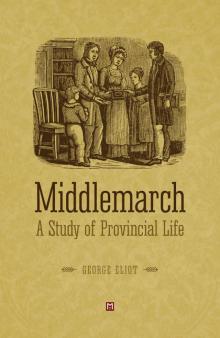 Middlemarch
Middlemarch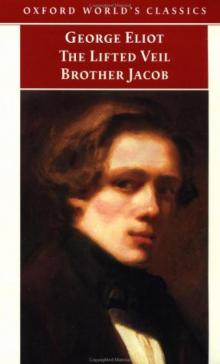 Brother Jacob
Brother Jacob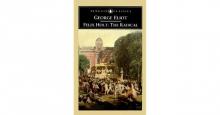 Felix Holt, the Radical
Felix Holt, the Radical Mr Gilfil's Love Story
Mr Gilfil's Love Story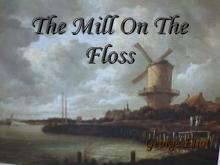 The Mill on the Floss
The Mill on the Floss Silas Marner
Silas Marner Adam Bede
Adam Bede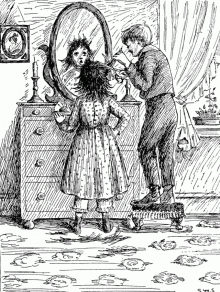 Tom and Maggie Tulliver
Tom and Maggie Tulliver The Damn Fool
The Damn Fool The Lifted Veil
The Lifted Veil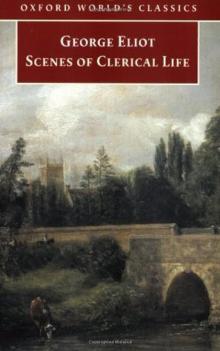 Scenes of Clerical Life
Scenes of Clerical Life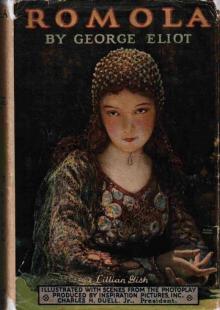 Romola
Romola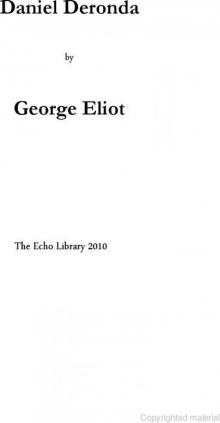 Daniel Deronda
Daniel Deronda Felix Holt
Felix Holt